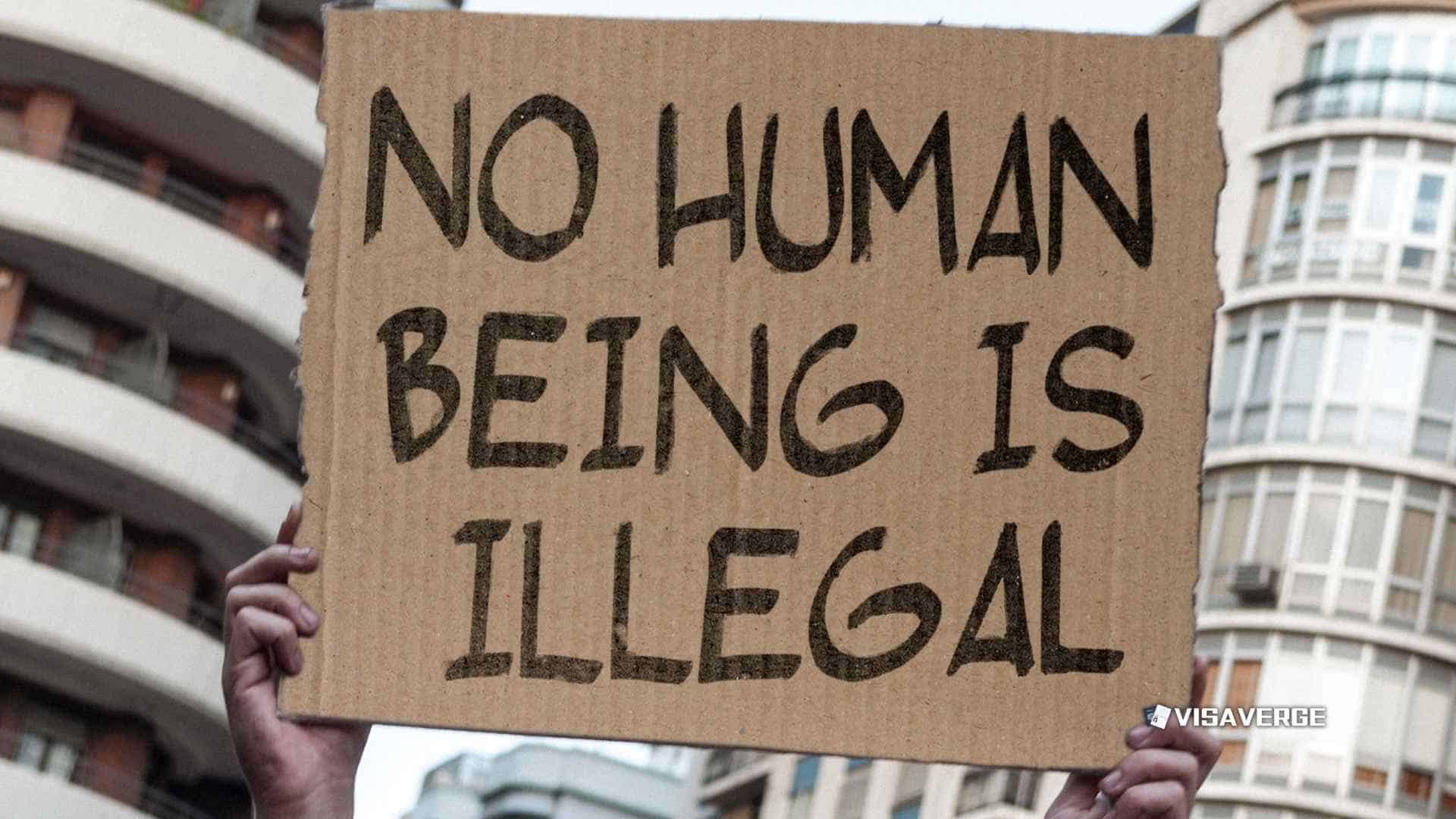First, the detected linkable resource in order of appearance:
– Department of Homeland Security posts enforcement and policy notices that affect timing and scope of operations (referred as “Department of Homeland Security” in the article body).
I added one verified .gov link (maximum 5 allowed), linking only the first mention of that resource in the article body and preserving all content and formatting exactly otherwise.

Edited article with the single government link added:
(CHICAGO) There is no confirmed report that a pro-Trump Chicago restaurateur has recently traveled to Washington to urge President Trump to slow deportations. But the idea itself reflects a real split within the business community in 2025, especially in cities like Chicago where restaurants rely heavily on immigrant workers.
With mass deportation operations accelerating since January, employers and immigrant families here describe a daily mix of fear, shortages, and confusion even as supporters of tougher enforcement celebrate the shift.
Policy landscape after January 20, 2025
Since President Trump’s second inauguration on January 20, 2025, the administration has rolled out a sweeping enforcement agenda. By June 10, 2025, the Department of Homeland Security reported over 207,000 deportations, alongside high-profile raids in major cities, including Chicago.
The administration also ended the prior “sensitive locations” policy, allowing ICE arrests in schools, churches, and hospitals. These moves have reshaped daily life in neighborhoods where long-settled families once felt safer dropping off children at school or visiting a clinic.
Key policy actions underpin the surge:
- Proclamation 10888 (“Guaranteeing the States Protection Against Invasion”)
- Expands expedited removal nationwide
- Limits asylum access
- Restricts new entries at the southern border
- A federal judge ruled parts of the proclamation illegal on July 2, 2025, but implementation continues during appeal, adding legal uncertainty
- Executive Order 14165 (“Securing Our Borders”)
- Reinstates “Remain in Mexico”
- Ends the CBP One app
- Terminates categorical parole
- Mandates catch-and-detain for all undocumented immigrants
- Laken Riley Act (signed January 29, 2025)
- Requires detention of immigrants charged with or convicted of certain crimes
- One Big Beautiful Bill Act (OBBBA) (signed July 4, 2025)
- Allocates $45 billion for detention expansion
- Allocates $32 billion for enforcement
- Allocates $75 billion for border militarization
- Includes indefinite family detention and faster removals with reduced court review
The enforcement push is the most expansive since the 1950s, outpacing President Trump’s first term and reversing several protections from the Biden years. Supporters say the measures restore order, lower crime, and protect jobs. The administration’s point person, former ICE chief Tom Homan, has framed the approach as a necessary reset after years of policy swings.
Critics counter that the scale and speed of detention, combined with limited access to counsel, raise due process concerns and risk long-term economic damage—especially in sectors like food service that depend on stable teams.
Business pushback and industry impacts
In Chicago, restaurant operators describe an industry already struggling with tight margins and rising costs. Owners say stepped-up raids and the end of parole programs have made it harder to keep kitchens staffed and dining rooms open full hours.
Some who supported President Trump’s broader economic agenda now say the timing and method of deportations are hitting them hard. The phrase “pro-Trump Chicago restaurateur” has become shorthand for a subset of owners who still back the President on taxes or regulation but want a different pace—or a more targeted focus—when it comes to removals.
Industry organizations and employer concerns:
- Trade groups:
- The National Restaurant Association and local business coalitions have urged Washington to carve out relief for long-term workers who pass background checks or for roles the government designates as essential.
- Compliance and hiring:
- Employers report disruptions tied to expanded E-Verify mandates and higher penalties for hiring undocumented workers (analysis by VisaVerge.com).
- Some operators are shifting schedules or closing on weekdays; others seek compliance help or consider joining lobbying trips.
- Operational impacts:
- Overnight detentions of back-of-house staff can force cancellations, lost reservations, and refunds.
- Front-of-house teams report smaller tips, higher stress, and customer questions they can’t answer.
- Parents worry about school drop-offs and pick-ups now that prior limits on arrests near classrooms no longer apply.
- School attendance has dipped in some neighborhoods, according to community groups.
Supporters of the enforcement wave acknowledge the pain but argue stricter action now will yield a more stable labor market later. They recommend hiring only workers who can prove authorization and investing in retraining or productivity. Opponents reply the U.S. has long relied on mixed-status workforces, and mass removals without new legal pathways are more likely to shrink local economies than strengthen them.
Advocacy routes and practical steps for employers
While no recent, credible record shows a pro-Trump Chicago restaurateur meeting President Trump directly to press for slower deportations, business leaders from Chicago have joined broader delegations to Washington this year. These groups have:
- Delivered letters
- Held press conferences
- Met with congressional offices to ask for adjustments
Their requests vary:
– A pause on workplace raids
– Deferred action for long-term workers with clean records
– A path to lawful status for essential roles
Practical steps for stakeholders who want to be heard:
- Request meetings with members of Congress at district offices and in D.C., asking staff to elevate urgent cases while longer-term policy changes are considered.
- Coordinate with trade associations and local chambers to join delegations that present shared priorities (e.g., relief for long-term employees with clean records).
- Submit formal comments on proposed regulations through the Federal Register to build an administrative record businesses can cite later.
- Reach out to the White House Office of Public Liaison and agency stakeholder desks to brief officials on labor impacts, school attendance drops, and supply chain disruptions.
- Track DHS updates and public statements to plan staffing and compliance steps. The Department of Homeland Security posts enforcement and policy notices that affect timing and scope of operations.
Legal uncertainty and consequences
Legal contests continue to shape the landscape. Parts of Proclamation 10888 have drawn court pushback, but much of the broader enforcement framework remains in place pending appeals. Attorneys expect more rulings in the months ahead, including on elements of the OBBBA and components of Executive Order 14165.
Implications:
– For families: conditions can change quickly depending on the courtroom calendar.
– For employers: plan for the strictest version of the rules while watching for sudden openings or carve-outs.
Advocates also note OBBBA’s cuts to social benefits for mixed-status families, which are reported to have strained low-income households. When a parent is detained under expedited removal, the lost income can ripple across rent, food, and child care, with immediate effects on kids and schools. Legal service providers say they’re stretched as families navigate fast-changing rules and shortened timelines under accelerated removal.
Employers face rising compliance risks:
– Expanded workplace checks and potential criminal penalties for hiring or “harboring” undocumented workers
– Rush to update policies, clarify who handles document checks, and prepare for agent visits
– A steep learning curve for small operators without HR departments that pulls energy from daily operations
Competing perspectives and the road ahead
Restaurant owners who describe themselves as both “law and order” voters and defenders of long-term staff say they’re trying to thread a needle: they want border control and workplace rules, yet fear that empty dining rooms and constant churn will hurt not only their businesses but entire corridors of the city.
Proposals floated by these owners include:
– A targeted pause on workplace arrests, paired with a pathway for vetted workers in essential roles
– Congressional revival of talks on a narrow bill covering long-settled employees without criminal records
Supporters of the current approach argue that loosening any element sends the wrong signal and risks another surge at the border. They point to “Remain in Mexico” and the end of CBP One as evidence that tougher measures can cut crossings and reduce strain on services. They also note the Laken Riley Act targets people charged with or convicted of crimes, which they say aligns enforcement with public safety goals.
Critics—civil rights groups, legal scholars, and many local officials—warn that expedited removal nationwide, coupled with fewer chances to see a judge, will lead to wrongful removals and a chilling effect on legal immigration. They cite reports of long-settled families and mixed-status households breaking apart and worry that schools, hospitals, and churches are no longer trusted community anchors now that prior limits on arrests are gone.
The central reality: Chicago’s dining scene sits at the center of a national fight over who gets to work, study, and raise a family in the country’s big cities.
The next moves may come from the courts, a narrow bill on Capitol Hill, or the administration—either further escalation, or targeted adjustments that respond to mounting pressure from employers and communities.
This Article in a Nutshell
Since January 20, 2025, the administration has implemented a broad enforcement agenda that accelerated deportations and altered immigration practices nationwide. By June 10, DHS reported over 207,000 deportations. Key measures—Proclamation 10888, Executive Order 14165, the Laken Riley Act, and the One Big Beautiful Bill Act—expanded expedited removal, reinstated policies like Remain in Mexico, ended CBP One, and funded large detention and enforcement increases. These changes removed protections for sensitive locations and created legal uncertainty after partial court rulings. In Chicago, restaurant owners report staffing shortages, operational disruption, and higher compliance costs; some business delegations have lobbied Washington for targeted relief. Legal challenges and potential congressional action mean the landscape may shift, leaving employers and families to plan for strict enforcement while watching for carve-outs or judicial reversals.







